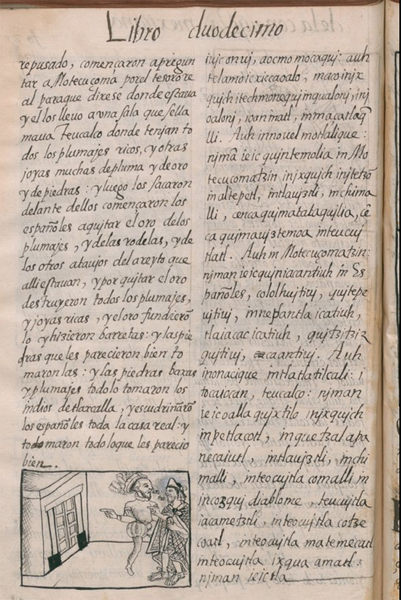Folio 27 verso
Translations and Transcriptions
Spanish Translation
[Translation of the Nahuatl into Spanish by Fr. Bernardino de Sahagún; transcription of the Spanish (left-hand column) by James Lockhart:] [f. 27v.] repusado, començaron a preguntar a Motecuçoma por el tesoro real para que dixese donde estaua y el los lleuo a vna sala que se llamaua Teucalco donde tenian todos los plumajes ricos, y otras joyas muchas de pluma y de oro y de piedras: y luego los sacaron delante dellos començaron los españoles a quitar el oro de los plumajes, y de las rodelas, y de los otros atauios del areyto que alli estauan, y por quitar el oro destruyeron todos los plumajes, y joyas ricas, y el oro fundierōlo y hizieron barretas: y las piedras que les parecieron bien tomaronlas: y las piedras baxas y plumajes todo lo tomaron los indios de tlaxcalla, y escudriñarō los españoles toda la casa real: y tomaron todo lo que les parecio bien.
English Translation
[Translation of the Nahuatl (right-hand column) by James Lockhart:]
went to him; no longer was he heeded. But he was not therefore forsaken; he was given all he needed to eat and drink, and water and deer fodder [for the Spaniards].
And when [the Spaniards] were well settled, right away they interrogated Moteucçoma about all the stored treasure of the altepetl, the devices and shields. They greatly prodded him, they eagerly sought gold as a thing of esteem. And then Moteucçoma went along leading the Spaniards. They gathered about him, bunched about him; he went in their midst, leading the way. They went along taking hold of him, grasping him. And when they reached the storehouse, the place called Teocalco, then all the
Analytic Transcription
[Transcription of the Nahuatl (right-hand column) by James Lockhart:] [f. 27v.] iuic onui, aocmo mocaqui:auh tel amo ic xiccaoalo, maco in ixquich itech monequiin qualoni, in ioaloni, ioan in atl, in maçatlaq̄lli. Auh inn o uel motlalique: nimā ie ic quintemolia in Motecuçomatzin in ixquich in itetzō in altepetl, in tlauiztli, in chimalli, cenca quimatataquilia, cēca quimauiztemoa in teucuitlatl. Auh in Motecuçomatzin: niman ie ic quiniacantiuh in Españoles, cololhuitiui, quitepeuitiui, innepantla icatiuh, tlaiacac icatiuh, quitzitzizquitiui,* caantiui. Auh in onacique in tlatlatilcali:** itocaiocan, teucalco: niman ie ic oallaquixtilo in ixquichin petlacotl, in quetzalapanecaiutl, in tlauiztli, in chimalli, in teocuitlacomalli in incozqui diablome, teucuitlaiacametzli, in teocuitlacotzecoatl,*** in teocuitlamatemecatl, in teocuitlaixquaamatl: niman ie ic tla ---------- *QUITZITZIZQUITIUI. Read "quitzitzitzquitiui." See also fol. 26v. **TLATLATILCALI. Read "tlatlatilcalli." Nevertheless, the form "cali" for calli is found as a variant in texts of many kinds. ***TEOCUITLACOTZECOATL. Read "teocuitlacotzeoatl."
Image

Spanish Translation
[Translation of the Nahuatl into Spanish by Fr. Bernardino de Sahagún; transcription of the Spanish (left-hand column) by James Lockhart:] [f. 27v.] repusado, començaron a preguntar a Motecuçoma por el tesoro real para que dixese donde estaua y el los lleuo a vna sala que se llamaua Teucalco donde tenian todos los plumajes ricos, y otras joyas muchas de pluma y de oro y de piedras: y luego los sacaron delante dellos començaron los españoles a quitar el oro de los plumajes, y de las rodelas, y de los otros atauios del areyto que alli estauan, y por quitar el oro destruyeron todos los plumajes, y joyas ricas, y el oro fundierōlo y hizieron barretas: y las piedras que les parecieron bien tomaronlas: y las piedras baxas y plumajes todo lo tomaron los indios de tlaxcalla, y escudriñarō los españoles toda la casa real: y tomaron todo lo que les parecio bien.
English Translation
[Translation of the Nahuatl (right-hand column) by James Lockhart:]
went to him; no longer was he heeded. But he was not therefore forsaken; he was given all he needed to eat and drink, and water and deer fodder [for the Spaniards].
And when [the Spaniards] were well settled, right away they interrogated Moteucçoma about all the stored treasure of the altepetl, the devices and shields. They greatly prodded him, they eagerly sought gold as a thing of esteem. And then Moteucçoma went along leading the Spaniards. They gathered about him, bunched about him; he went in their midst, leading the way. They went along taking hold of him, grasping him. And when they reached the storehouse, the place called Teocalco, then all the
Analytic Transcription
[Transcription of the Nahuatl (right-hand column) by James Lockhart:] [f. 27v.] iuic onui, aocmo mocaqui:auh tel amo ic xiccaoalo, maco in ixquich itech monequiin qualoni, in ioaloni, ioan in atl, in maçatlaq̄lli. Auh inn o uel motlalique: nimā ie ic quintemolia in Motecuçomatzin in ixquich in itetzō in altepetl, in tlauiztli, in chimalli, cenca quimatataquilia, cēca quimauiztemoa in teucuitlatl. Auh in Motecuçomatzin: niman ie ic quiniacantiuh in Españoles, cololhuitiui, quitepeuitiui, innepantla icatiuh, tlaiacac icatiuh, quitzitzizquitiui,* caantiui. Auh in onacique in tlatlatilcali:** itocaiocan, teucalco: niman ie ic oallaquixtilo in ixquichin petlacotl, in quetzalapanecaiutl, in tlauiztli, in chimalli, in teocuitlacomalli in incozqui diablome, teucuitlaiacametzli, in teocuitlacotzecoatl,*** in teocuitlamatemecatl, in teocuitlaixquaamatl: niman ie ic tla ---------- *QUITZITZIZQUITIUI. Read "quitzitzitzquitiui." See also fol. 26v. **TLATLATILCALI. Read "tlatlatilcalli." Nevertheless, the form "cali" for calli is found as a variant in texts of many kinds. ***TEOCUITLACOTZECOATL. Read "teocuitlacotzeoatl."
Image
